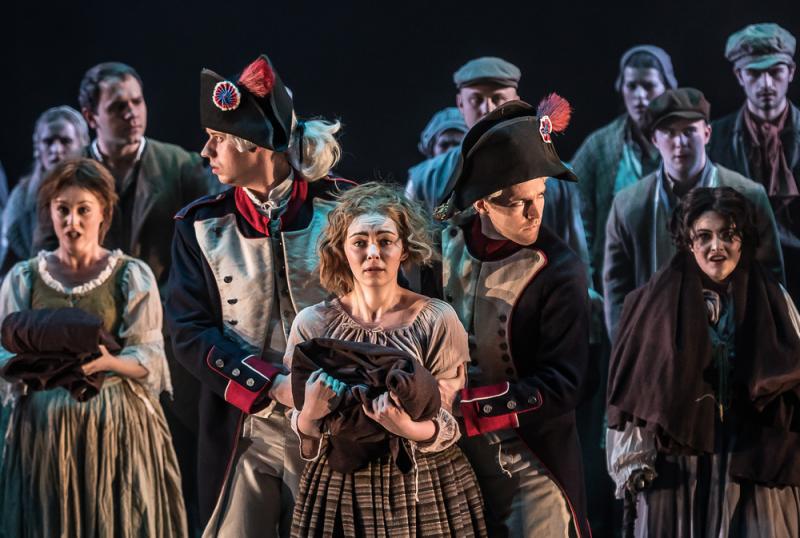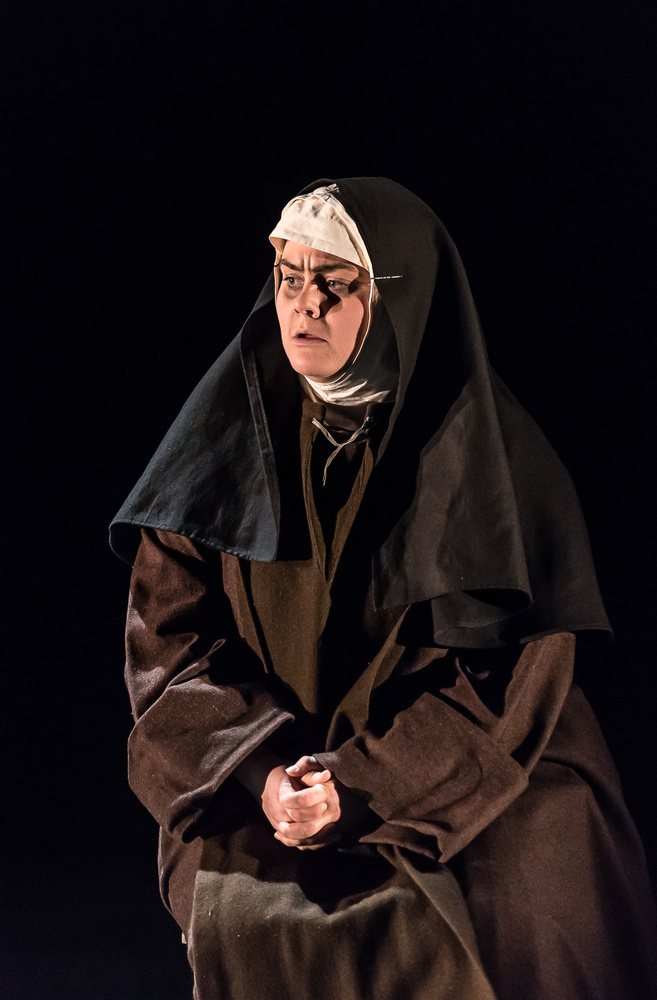Dialogues des Carmélites, Guildhall School review - calm and humane drama of faith | reviews, news & interviews
Dialogues des Carmélites, Guildhall School review - calm and humane drama of faith
Dialogues des Carmélites, Guildhall School review - calm and humane drama of faith
Poulenc's masterpiece presented with considered unity but lacking textual subtlety

One question dominates any staging of Dialogues des Carmélites. How will the production team deal with the cruelty and tragedy in the 12th and last scene when all of the nuns, one by one, go through with their vow of martyrdom and calmly proceed to the guillotine, singing the Salve Regina?
Scenographer takis, director Martin Lloyd-Evans, and lighting designer Robbie Butler have made a production which concentrates the audience’s attention on the characters and on the text. The scenery is minimal and symbolic, it never gets in the way, and there is much clever and allusive use of hanging stage flats. (These do have the habit of occasionally swinging gently like Foucault’s pendulum, but that – I guess – is their fate.)
 Poulenc explained one of his priorities in the composition in the very early stages of the composition of Dialogues des Carmélites. In a letter to Pierre Bernac as he was getting going very rapidly with the project in 1953: he referred to “a very clear orchestration to let the text pass through”. So the tough challenge for non-native speaker singers at the beginning of their singing careers is to bring out the clarity and intent in the libretto which Poulenc extracted from a play by Georges Bernanos (1888-1948). Recordings and recent productions – like the Brussels one with Véronique Gens in the role of the second Prioress Madame Lidoine – set the bar high. In this Guildhall production the singers in the first of two casts who did best were Claire Lees as Soeur Constance (delightful, even fitting in a bit of Whoopi Goldberg Sister Act dancing), Chloe Latchmore as Mère Marie and the tenors Eduard Mas Bacardit as the Chevalier and Daniel Mullaney as the Aumônier (they will reverse roles in the second cast). Blanche (Lucy Anderson), the old Prioress (Georgia Bishop, pictured above) and the second Prioress (Michelle Alexander) all gave affecting and vocally secure performances, but I wanted more of Bernanos’ textual subtlety to shine through.
Poulenc explained one of his priorities in the composition in the very early stages of the composition of Dialogues des Carmélites. In a letter to Pierre Bernac as he was getting going very rapidly with the project in 1953: he referred to “a very clear orchestration to let the text pass through”. So the tough challenge for non-native speaker singers at the beginning of their singing careers is to bring out the clarity and intent in the libretto which Poulenc extracted from a play by Georges Bernanos (1888-1948). Recordings and recent productions – like the Brussels one with Véronique Gens in the role of the second Prioress Madame Lidoine – set the bar high. In this Guildhall production the singers in the first of two casts who did best were Claire Lees as Soeur Constance (delightful, even fitting in a bit of Whoopi Goldberg Sister Act dancing), Chloe Latchmore as Mère Marie and the tenors Eduard Mas Bacardit as the Chevalier and Daniel Mullaney as the Aumônier (they will reverse roles in the second cast). Blanche (Lucy Anderson), the old Prioress (Georgia Bishop, pictured above) and the second Prioress (Michelle Alexander) all gave affecting and vocally secure performances, but I wanted more of Bernanos’ textual subtlety to shine through.
Conductor Dominic Wheeler’s sense of pace and balance throughout and the orchestral standard was very high indeed. The strings led by Enyuan Khong played with clarity. Flutes, clarinets and bassoons all had a great night. The writing for the horns is merciless and there were very occasional, forgivable mishaps. Tuba player Anna Carter underpinned a wonderful moment in Act II with delicacy and poise. Carmélites is a tricky work but its uniquely subtle strengths shone through last night.
The future of Arts Journalism
You can stop theartsdesk.com closing!
We urgently need financing to survive. Our fundraising drive has thus far raised £49,000 but we need to reach £100,000 or we will be forced to close. Please contribute here: https://gofund.me/c3f6033d
And if you can forward this information to anyone who might assist, we’d be grateful.

Subscribe to theartsdesk.com
Thank you for continuing to read our work on theartsdesk.com. For unlimited access to every article in its entirety, including our archive of more than 15,000 pieces, we're asking for £5 per month or £40 per year. We feel it's a very good deal, and hope you do too.
To take a subscription now simply click here.
And if you're looking for that extra gift for a friend or family member, why not treat them to a theartsdesk.com gift subscription?
more Opera
 The Railway Children, Glyndebourne review - right train, wrong station
Talent-loaded Mark-Anthony Turnage opera excursion heads down a mistaken track
The Railway Children, Glyndebourne review - right train, wrong station
Talent-loaded Mark-Anthony Turnage opera excursion heads down a mistaken track
 La bohème, Opera North review - still young at 32
Love and separation, ecstasy and heartbreak, in masterfully updated Puccini
La bohème, Opera North review - still young at 32
Love and separation, ecstasy and heartbreak, in masterfully updated Puccini
 Albert Herring, English National Opera review - a great comedy with depths fully realised
Britten’s delight was never made for the Coliseum, but it works on its first outing there
Albert Herring, English National Opera review - a great comedy with depths fully realised
Britten’s delight was never made for the Coliseum, but it works on its first outing there
 Carmen, English National Opera review - not quite dangerous
Hopes for Niamh O’Sullivan only partly fulfilled, though much good singing throughout
Carmen, English National Opera review - not quite dangerous
Hopes for Niamh O’Sullivan only partly fulfilled, though much good singing throughout
 Giustino, Linbury Theatre review - a stylish account of a slight opera
Gods, mortals and monsters do battle in Handel's charming drama
Giustino, Linbury Theatre review - a stylish account of a slight opera
Gods, mortals and monsters do battle in Handel's charming drama
 Susanna, Opera North review - hybrid staging of a Handel oratorio
Dance and signing complement outstanding singing in a story of virtue rewarded
Susanna, Opera North review - hybrid staging of a Handel oratorio
Dance and signing complement outstanding singing in a story of virtue rewarded
 Ariodante, Opéra Garnier, Paris review - a blast of Baroque beauty
A near-perfect night at the opera
Ariodante, Opéra Garnier, Paris review - a blast of Baroque beauty
A near-perfect night at the opera
 Cinderella/La Cenerentola, English National Opera review - the truth behind the tinsel
Appealing performances cut through hyperactive stagecraft
Cinderella/La Cenerentola, English National Opera review - the truth behind the tinsel
Appealing performances cut through hyperactive stagecraft
 Tosca, Royal Opera review - Ailyn Pérez steps in as the most vivid of divas
Jakub Hrůša’s multicoloured Puccini last night found a soprano to match
Tosca, Royal Opera review - Ailyn Pérez steps in as the most vivid of divas
Jakub Hrůša’s multicoloured Puccini last night found a soprano to match
 Tosca, Welsh National Opera review - a great company reduced to brilliance
The old warhorse made special by the basics
Tosca, Welsh National Opera review - a great company reduced to brilliance
The old warhorse made special by the basics
 BBC Proms: The Marriage of Figaro, Glyndebourne Festival review - merriment and menace
Strong Proms transfer for a robust and affecting show
BBC Proms: The Marriage of Figaro, Glyndebourne Festival review - merriment and menace
Strong Proms transfer for a robust and affecting show
 BBC Proms: Suor Angelica, LSO, Pappano review - earthly passion, heavenly grief
A Sister to remember blesses Puccini's convent tragedy
BBC Proms: Suor Angelica, LSO, Pappano review - earthly passion, heavenly grief
A Sister to remember blesses Puccini's convent tragedy

Add comment